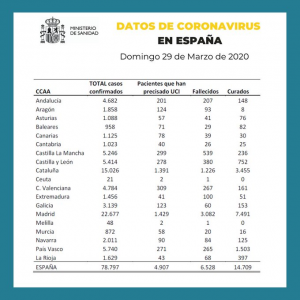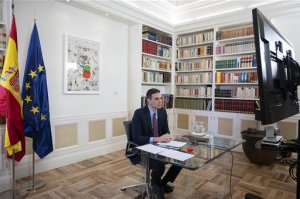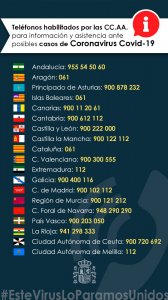Report updated in Spain at 23.50h on 29 March.
UPDATED: Following an extraordinary cabinet meeting held on Sunday, the Spanish government has now approved the new measures announced by prime minister Pedro Sánchez during his televised address on Saturday evening (reported below). The details were published in Spain’s official gazette – the Boletín Oficial del Estado – late on Sunday night.
The new measures now mean that all non-essential workers in Spain must also remain at home from 30 March until 9 April inclusive, thereby also including the Easter weekend. The definition of what work qualifies as essential or not, however, looks set to create problems on Monday morning in Spain.
The Spanish government initially declared a lockdown for two weeks commencing from 14 March, with measures that confined everyone to their homes apart from leaving to purchase food or medication, or to go to their place of work only if they could not perform their duties from home. These measures were then extended by the Spanish Congress until 12 April.
Until after Easter, people in Spain – to now include ‘non-essential’ workers – are only permitted to leave their homes to purchase food or medicine, to buy petrol or for other special circumstances, or to walk their dogs.
These new measures restrict the movement of all workers with the exception of those employed in the sectors of food, medicine, healthcare, veterinarians, opticians, the media, fuel and energy, tobacconists, IT and telecoms services, pet food and dry cleaners. There are a total of 25 categories of businesses (other than healthcare and emergency services) that can remain open. Banks also remain open, where appointments are required. Motor mechanics remain in operation for freight and emergency vehicles.
Spanish government spokeswoman María Jesús Montero confirmed after Sunday’s cabinet meeting that all non-essential workers would be in lockdown from tomorrow for a two-week period in order to ‘gain time’ and relieve the burden on Spain’s health system. Montero said it was now essential to reduce the mobility of citizens between Monday to Friday in order to beat the pandemic.
Spanish Labour Minister Yolanda Díaz also spoke on Sunday after the cabinet meeting, saying that companies will have to pay workers’ salaries in full for the next two weeks, and that employees will then have until 31 December to recover working the hours that they have missed on a gradual basis.
‘We are talking about a period of eight working days,’ said Díaz, as Thursday 9 and Friday 10 April are both holidays in most regions of Spain due to Easter.
EARLIER REPORT WITH LATEST FIGURES
Official figures released by the Spanish Health Ministry at 11.45am on Sunday 29 March confirm 78,797 known cases of Coronavirus (Covid-19) in Spain, 6,549 more than yesterday. 6,528 people have died from the pandemic (up by 838 from yesterday – the new highest figure to date for Spain in a 24 hour period). Saturday’s figure was already a rise of 832 deaths compared to Friday).
There are 52,653 people in hospital due to Coronavirus, of which 4,907 are in intensive care. 14,709 people have now made a full recovery, which is 2,424 more than yesterday.
Of the official figures announced, 22,677 confirmed cases are known to be in the Madrid region, and where 3,087 have died (from the total 6,528 across the country).
There are now 15,026 cases in Catalonia (1,226 deaths), 5,740 in the Basque Country (265 deaths), 4,682 in Andalusia (207), 5,246 in Castilla La Mancha (539) and 4,784 in Valencia (267).
Figures for those infected with Coronavirus in other regions are as follows: Aragón 1,858 (93 deaths), Asturias 1,088 (41 deaths), Balearic Islands 958 (29), Canary Islands 1,125 (39), Cantabria 1,023 (26), Castilla y León 5,414 (380), Ceuta 21 (1), Extremadura 1,456 (100), Galicia 3,139 (60), Melilla 48 (1), Murcia 872 (20), Navarra 2,011 (90) and La Rioja 1,629 (68).

During a press conference on Sunday morning following the release of the latest figures, Fernando Simón, director of the Spanish Health Ministry’s Coordination Centre for Health Alerts, said the fact that 14,709 people have now been discharged from hospital represented almost 20% of those diagnosed.
Simón pointed out that the daily number of confirmed new cases of Coronavirus in Spain has been falling for several days. ‘Today it is 9%, but we need to be careful because there may be a delay [in reporting of figures from the regions] given that it is a weekend.’
Simón also said that, ‘It is quite possible [the situation] is evolving favourably … these are encouraging data.’ He also said, however, that there are now six regions of Spain that have reached their limit of intensive care capacity – but he did not name the regions.
‘All of the indicators on the progress of the epidemic are going in the right direction,’ said Simón. ‘The critical point now is to guarantee that the intensive care units [ICU]s do not reach saturation point.’
CORONAVIRUS in SPAIN
On Saturday evening Spanish Prime Minister Pedro Sánchez announced further measures will now be in place during the current lockdown in Spain, during a television broadcast.
Spain has the world’s second-highest Coronavirus death toll after Italy, and the country is already in lockdown until at least 12 April. But the strain on the country’s intensive care facilities has become a huge concern, with the greatest pressure expected in about a week’s time. This has prompted the Spanish government to increase the restrictions.
Sánchez announced that all non-essential work must be suspended as the country continues its fight against the pandemic.
‘All workers in non-essential economic activities must stay at home for two weeks,’ Sánchez said, in a measure that follows similar moves in Italy.
Prime Minister Sánchez, who is the head of Spain’s socialist PSOE party, leads a coalition government with the left-wing Podemos group. Podemos had been pressuring Sánchez for more drastic measures to be introduced against Coronavirus. Many of Spain’s regional presidents had also been demanding tougher lockdown measures, specifically the president of the Catalan government, Quim Torra.
‘This measure will reduce the mobility of people even further, it will reduce the risk of contagion and will allow us to decongest the intensive care units, (ICUs),’ said Sánchez.
‘The most important thing is to slow the number of people being taken to hospital,’ Sánchez said in his TV address. ‘The virus is hitting us with relentless brute force … [now] is the time to intensify the battle.’
The Spanish government initially declared a state of alarm lockdown for two weeks commencing from 14 March, with measures that confined everyone to their homes apart from leaving to purchase food or medication, or to go to their place of work only if they could not perform their duties from home. These measures were then extended by the Spanish Congress until 12 April, to include the Easter weekend.
The new measures announced on Saturday will affect those working in construction and other non-essential sectors although they will continue to receive their salaries, Sánchez said. The new restrictions will mean that all non-essential workers must now remain at home until 9 April, and therefore until after the Easter weekend.
In his TV address, Sánchez added that workers of non-essential jobs will have a paid allowance and will have to make up for the time after confinement ‘progressively’. He said that agreements between workers and employers would ideally include ‘making up for half an hour or an hour a day by 31 December.’
Sánchez pointed out that the fact that some days are bank holiday due to Easter makes that in practice, the working days affected by the new measures are only eight.
‘The measures that the government is taking are extremely severe’ acknowledged Sánchez.
During Sunday, Catalan president Quim Torra issued a statement, thanking the Spanish government ‘for having finally accepted Catalonia’s demands’, reminding Sánchez this is what he had been demanding since 13 March.
Madrid remains the worst-hit region of Spain, with 3,087 deaths and 22,677 infections, with all its hospitals and mortuaries overwhelmed.
Madrid authorities opened a new morgue last week at the ice skating rink at the Palacio de Hielo (Ice Palace) shopping centre. There are now plans to open a second temporary morgue in an unused public building near the airport.

With funeral workers overwhelmed, the Spanish government has also authorised the army’s involvement in the collection and transport of bodies for the duration of the state of alarm.
On Saturday, Spain also received a delivery of 1.2m surgical masks from China. The delivery includes some 387,000 masks for healthcare personnel, 75,000 masks for the security forces and more than 725,000 for those in the transport sector, from bus drivers to port and airport staff as well as those working for the postal service.
Late last week Spain acknowledged that 659,000 faulty test kits had been ordered from a Chinese supplier. They had been bought via the Chinese company Bioeasy, a firm that according to the Chinese Embassy in Spain did not have a license to operate and nor has been included in the list of recommended medical suppliers by the Chinese government.
GLOBAL OVERVIEW
Also during his television address on Saturday evening, Pedro Sánchez made reference to the overall European response to the pandemic, and the European Council‘s video-conference in which he had participated on Thursday.
‘Europe has not … attracted the virus,’ Sánchez said. ‘Nor has Spain or any other European partner country. The virus has penetrated Europe following a random path. And just as this catastrophe is putting the whole world to the test, it is putting the European project to the test in a very special way.’
During Thursday’s EU Council’s a summit, several Northern European countries refused the calls from members that have been harder hit by the pandemic, such as Spain and Italy. These countries had been seeking the creation of ‘Coronabonds’ to share the financial burden of the crisis. It was refused.
‘The response [to the economic crisis from the pandemic] cannot be national,’ said Sánchez on Saturday evening. ‘It has to be European and with all resources at the most critical time for the EU since its foundation, when we all need to work together, whether we are Dutch, Spanish or German.’
This report is currently being updated
Below are the numbers to call for each region of Spain for information and assistance in the event of possible cases of Coronavirus – as issued by the Spanish health authorities.

Up-to-date WHO advice and facts (in English) about the Coronavirus epidemic can be found here: www.who.int/emergencies/diseases/novel-coronavirus-2019/technical-guidance.
Our previous reports on Coronavirus in Spain:
ALSO READ: Coronavirus in Spain full update (28 March)
ALSO READ: Coronavirus in Spain full update (27 March)
ALSO READ: Coronavirus in Spain full update (26 March)
ALSO READ: Animal rights NGO starts petition against possible state aid for cancelled bullfights
ALSO READ: Spain publishes list of hotels that will remain open
ALSO READ: Coronavirus in Spain full update (25 March)
ALSO READ: Coronavirus in Spain full update (24 March)
ALSO READ: Video of boy training as goalkeeper in isolation goes viral
ALSO READ: The new restrictions at Spain’s airports, ports and land borders
ALSO READ: Coronavirus in Spain full update (23 March)
ALSO READ: Madrid starts receiving patients at IFEMA exhibition centre ‘hospital’
ALSO READ: Confirmed: lockdown extended until at least 11 April
ALSO READ: Coronavirus in Spain full update (22 March)
ALSO READ: Walking a goat or a Vietnamese pig is not allowed
ALSO READ: Coronavirus in Spain – full advice for British travellers seeking to return to the UK
ALSO READ: Coronavirus in Spain full update (21 March)
ALSO READ: Coronavirus in Spain full update (20 March)
ALSO READ: ‘This virus we will stop together’ – video
ALSO READ: Coronavirus in Spain full update (19 March)
ALSO READ: Despite lockdown, Spaniards applaud health workers from balconies every evening
Editor’s note:
At Spain in English we’re always keen to also publish positive stories and features about life in Spain – not just the current news. With all cultural and sporting events currently on hold, as well as travel and gastronomic excursions, we welcome on-going contributions from all of you who’d like to send us articles for publication. Although we are unable to currently pay for contributions, we will certainly credit you and share the articles across our social media network (if of interest) – and/or also link to your own blogs or other sites. We currently welcome upbeat, positive and fun articles – perhaps how you’re coping with the ‘lockdown’ in your own area of Spain – or how your community is responding, or recommendations of help to others. We have a dedicated ‘Opinion, Blogs & Spanish Experiences‘ section where your articles will appear. We will edit for clarity and length only – and we reserve the right to not publish. Articles should be sent via email to editorial@spainenglish.com (preferably with a photo and credit details), and should be around 500 words (800 to 1,000 max). We will try to respond to everyone, but please be patient with us. We’re a very small team but with big ambitions! Please stay safe. Thank you for reading and following us.
